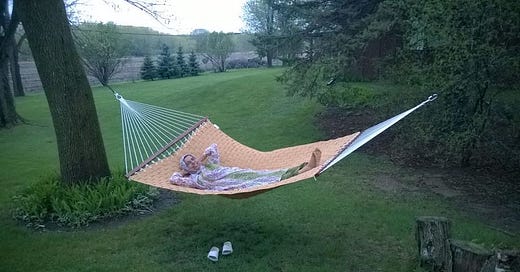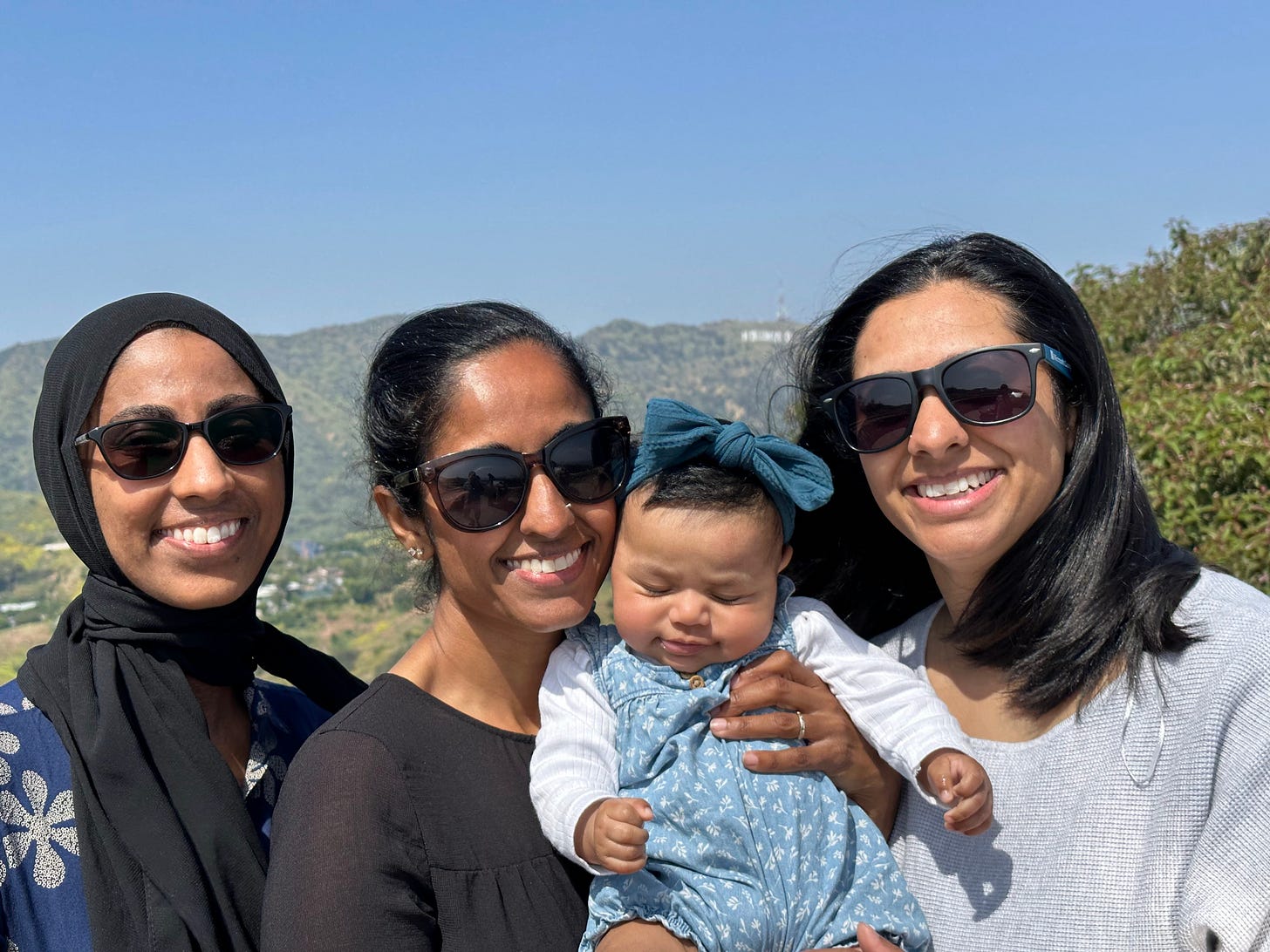I want to be clear about birthdays. Technically, the day that we celebrate on the Gregorian calendar is not the only calendar that we can claim. For example, Fatima Ashraf, my wife, was born on May 10. In the year she was born that corresponds to 6/Rajab. In an effort to decolonize our minds, we should remember to think about the roles that calendars and even the names of the days of the week and months are ways that our minds are colonized. Fatima would love a post dedicated to her to begin with a statement about colonization. She is a fierce anti-capitalist, pro-human, abolitionist who literally works everyday to shake the people around her out of their stupor and obsession with the status quo that is this life in this advanced stage of capitalism built on genocide and slavery.
All that being said, yes, today is Fatima Ashraf’s birthday. Her day usually arrives in conjunction with Mother’s Day which is bittersweet – mainly bitter – because Fatima’s mother has passed on and her presence is deeply missed.
I have to share a few thoughts on why I think that we should celebrate our mothers instead of ourselves on our birthday. It is a way to show gratitude for their love and sacrifices. Here are a few points to support this idea:
Our mothers literally carried us and then, through “labor,” brought us into the world and, to the best of their ability, nurtured us throughout our lives. Celebrating them on our birthday is a way to acknowledge the immense effort and love they put into raising us.
Mothers often put their own needs aside to focus on their children's well-being. Celebrating our mothers on our birthday is an opportunity to recognize and thank them for all the selfless acts they have done for us.
Celebrating our mothers on our birthday can also be a way to honor their own journey through life. Our mothers have their own personal milestones, and it is important to celebrate and acknowledge them for who they are as individuals.
It is a way to shift the focus away from us and acknowledge the important role our mothers played in shaping who we are today.
So on this day, Fatima’s birthday, let’s remember “Nanima” – an astonishing mother-in-law and a glorious and wonderful human being. She was filled with vigor and loved Allah deeply and it emanated in her every action.
Her smile brightened the day of whomever she was around. Inside her home, we ate like hobbits – there was always something yummy on the table or on the stove. She insisted on serving fresh vegetables and fruit alongside the meats, rice, stews, and bread. If we were going somewhere, she always made famous egg “anda” sandwiches. Someties, with achar, that I grew to love so much. After prayer times, she made everyone linger and insist that we do dhikr or make dua together – usually sitting on the floor. She would hand write and mail us letters and books with verses of Quran tucked into the pages and she advised us to recite daily and to reflect on our recitation.
Below is what I wrote about Mom on May 7, 2015 that appeared in Thought Catalog.
Spring in Fort Greene Park, Brooklyn, is glorious. There are budding trees, bright yellow forsythia blooming, and grass reaching for the sky. One morning last week, I came across an elderly black man in a heavy grey coat, a knit hat, and thick black shoes. He was shuffling down the hill to the back staircase. I greeted him, "Good morning old timer." He replied, "Young man, I’m 81 one years old. Let me tell you something." I of course nodded my head and looked into his cloudy eyes waiting for his words. “At my age, I could go at any time. You could be as strong as an ox, you could be healthy...” he trailed off and with one tooth he collected the saliva in his mouth. As the spit dripped from his lip to the newly green ground, he said, "when God says it's time, it’s your time.”
Five days before this encounter, my beloved mother-in-law passed. Her springtime passing makes me reflect on all the transitions that we make in life and how we prepare and deal with the ultimate transition. If you believe in some notion of an afterlife (I do), then you likely have a framework with which to approach those final hours. Your final hours could be at any point. You could die today. I could die today. Am I doing the right things? What do I believe about myself? How am I helping or hurting others? What am I leaving as my legacy?
“Heaven is a choice and hell is a choice,” the old man said. “I choose heaven. That’s where my mother and father are, it’s where my wife is.” Then he paused, “I got eight babies in heaven.”
My mother-in-law was a firm believer in a creator and an afterlife. She did more good deeds than anyone I knew. She fed countless people, taught countless children, took care of the elderly, planted countless trees, attended births, weddings, funerals, gave handmade gifts for every occasion, and never said a bad thing about anyone. She always said it was what she was commanded to do: leave the world better than she found it. She believed deeply in "Sadaqah-Jariyah (saad-ah-quah-jaa-ree-yah)," a term in Arabic that means "ceaseless charity." She did everything she could to ensure that the good things she did would continue to benefit people and planet even after her death. She was truly preparing and I believe she was prepared, to meet her maker. She lived an honorable and selfless life. Her husband, daughters, grandsons, siblings, nieces, nephews, and hundreds of friends and acquaintances, buried her under a tree in a beautiful cemetery near the home she tended to and the community she nourished. She chose heaven.
In the coming months (and even years), nothing will be the same. Sounds will be heard differently, smells will bring up memories, and questions will be rehashed over and over. My sons have and will continue to ask the toughest ones. "What time will Nanima be alive again?" "When will she come out of the dirt?" "Why did we plant her like a tree?" My answers to them will evolve as my own understanding of death and transition does. What I am able to explain now is that we have limited time on this earth and we need to live it with purpose. Like Nanima did.
I cannot imagine the life that the old man in the park lived where he lost eight children before his own death. I can only assume, based on his ramblings about Brooklyn and changing neighborhoods and wars in far off lands that his family was trapped in the scourge of the crack era and others were deployed. Before he walked off, the old man told me a story about Moses.
“God said, I have let you see [the promised land] with your eyes, but you will not cross over into it. And Moses the servant of the Lord died there … yet his eyes were not weak nor his strength gone.”
Moses, the baby found in the river and the last hope of a desperate people, died before he could see the fruit of his labor. My mother-in-law, besides wanting to leave the world having done good deeds, wanted to help raise righteous grandchildren. She left them too young, in their age of innocence. At her funeral, my instinct was to protect the boys. Instead, I saw in them a new light - they were playing on the grave, rubbing dirt between their hands and throwing flower petals back and forth.
Without their grandmother, but with her great legacy, my little boys are now beginning their own journey up the river.
To learn more about Behbood Ashraf's final Sadaqah-Jariyah project, click here.





Masha'Allah, thank you for sharing this and reminding us of all these beautiful lessons. May Allah bless sister Fatima, and she reunite with her mother in the highest station of paradise. Ameen!